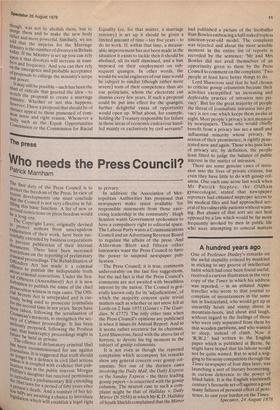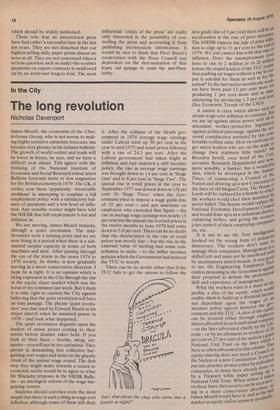Th e press
Who needs the Press Council?
The f •
irst duty of the Press Council • is to Protect the freedom of the Press. In view of recent developments one must conclude that the Council is not very effective in fulfilling this basic function. A list of new or revived restrictions on press freedom would he a long one. The Copyright Laws, originally devised
to protect authors from unscrupulous exPleitation of their work, have been. suce.essfully extended by business corporations At° Prevent publication of their internal mocurnents. There have been increased restrictions on the reporting of preliminary err,iMioal proceedings. The Rehabilitation of `-'ffenders Act has made it a criminal °ffence to publish the indisputable truth hab,c)ut criminal convictions. Under the Sex'11 Offences (Amendment) Act it is now lorbidden to publish the name of the chief Prosecution witness in rape cases. The Offierlal Secrets Act is unrepealed and is curcentlY being used to prosecute journalists for the second time in ten years. Steps have ,?,cen taken, following the serialisation of r`-rossman's memoirs, to strengthen the sec7riously pro ,ee.Y of Cabinet Proceedings. It has been
posed, following the Poulson ';ase, that bankruptcy proceedings might in unure be held in private. Tbe
'as offence of defamatory criminal libel 1. been recommissioned for use against Journalists. It is suggested that truth should no be a defence in civil libel actions it is coupled with evidence that pub'cation was in the public interest. Morgan "!llips's daughter has received to introduce a parliamentary permission t_he libel laws for a period of fifty extending Perscm,s years after death. And a number of her felleW. MN are awaiting a chance to introduce gtslation which will establish a legal right
to privacy.
In addition: the Association of Metropolitan Authorities has proposed that
newspapers make space available 'for responsible statements from those exercising leadership in the community'. Hugh Scanlon wants Government spokesmen to have a compulsory right to editorial space. The Labour Party wants a Communications Council and an Advertising Revenue Board to regulate the affairs of the press. And Alderman Blott and fifteen other luminaries want the Press Council to have the power to suspend newspaper publication.
The Press Council, it is true, comments unfavourably on the last five suggestions, but the sad fact is that the Press Council's comments are not awaited with breathless interest by the nation. The Council is generally known only for its 'adjudications', of which the majority concern quite trivial matters such as whether or not snow fell at Lords on 2 June 1975 (Gomez v The Guardian, N 4777). The only other time when the Press Council's opinions are publicised is when it issues its Annual Report. And so it seems rather eccentric for its chairman, Lord Shawcross, faced with the above list of horrors, to devote his big moment to the subject of gossip columnists. It is not even as though the reported complaints which accompany his remarks show any general concern over gossip columnists. Not one of the thirteen cases involving the Daily Mail, the Daily Express or the Sunday Express — the three leading gossip papers — is concerned with the gossip columns. The nearest case to such a complaint might be that of Halliday V. Dad)' Mirror (N 5056) in which Mr K.D. Halliday of South Shields complained that the Mirror
had published a picture of the footballer Stan Bowles embracing a half-naked topless nineteen-year-old model. The complaint was rejected and about the most sensible moment in the entire list of reports is recorded by the sentence: 'Mr and Mrs Bowles did not avail themselves of an opportunity given to them by the Press Council to comment on the complaint.' Two people at least have better things to do.
Lord Shawcross said that he had chosen to criticise gossip columnists because their activities exemplified 'an increasing and deplorable practice of intrusion into privacy'. But for the great majority of people the threat of journalistic intrusion into privacy is not one which keeps them awake at night. Most people's privacy is not menaced by newspapers. Those who would chiefly benefit from a privacy law are a small and influential minority whose privacy, by reason of their prominence, is rightly penetrated now and again. Those who pass laws of privacy are, by definition, the people least fitted to judge the balance of public interest in the matter of intrusion.
There are some genuine cases of intrusion into the lives of private citizens, but even they have little to do with gossip columns. One such case arose last week when Mr Patrick Steptoe, the Oldham gynaecologist, stated that newspaper reporters had obtained improper access to his medical files and had approached several of his vulnerable patients without warning. But abuses of that sort are not best opposed by a law which would be far more frequently invoked by men in public life who were attempting to conceal matters which should be widely publicised.
Those who fear an unrestricted press have had rather a successful time in the last ten years. They are not disturbed that our highest-selling daily paper prints almost no news at all. They are not concerned when a serious question such as under-the-counter payments on export contracts is swallowed up by an irrelevant forgery trial. The most influential 'critics of the press' are really only interested in the possibility of controlling the press and preventing it from publishing inconvenient information. It would be nice to think that Fleet Street's cooperation with the Press Council was dependent on the determination of that hoary old quango to resist the anti-Press lobby.































 Previous page
Previous page